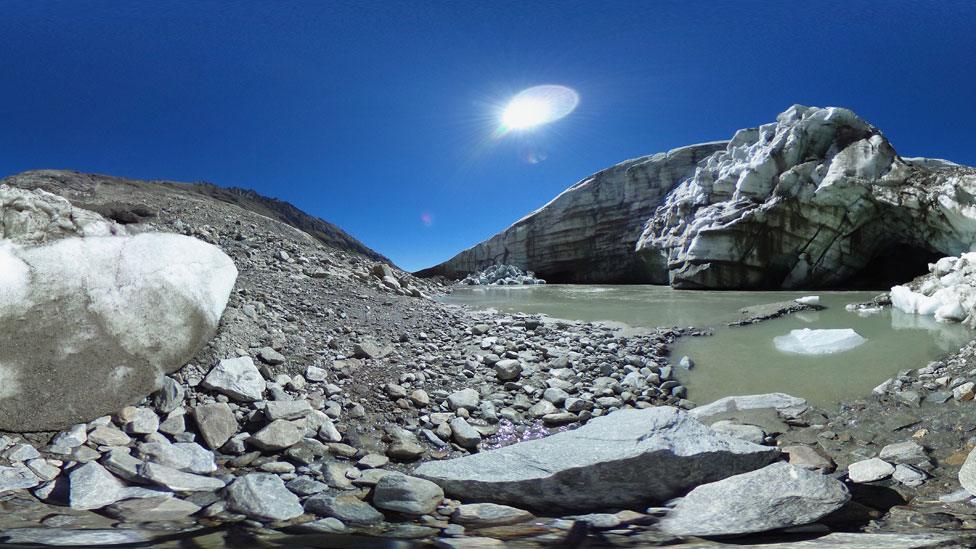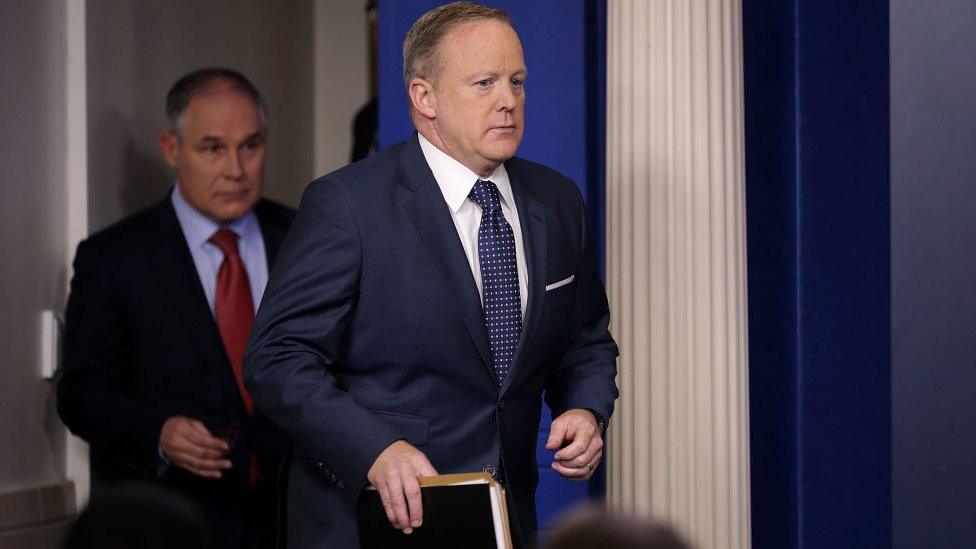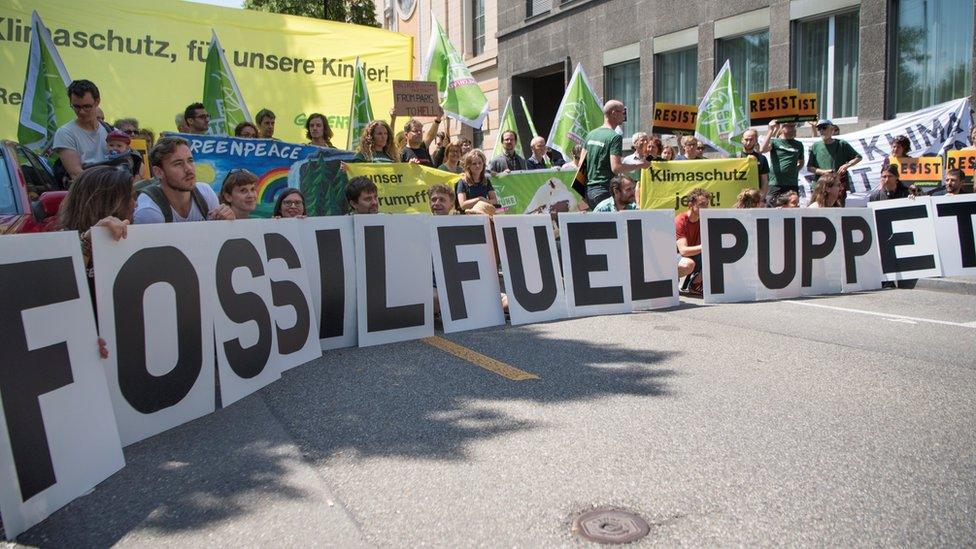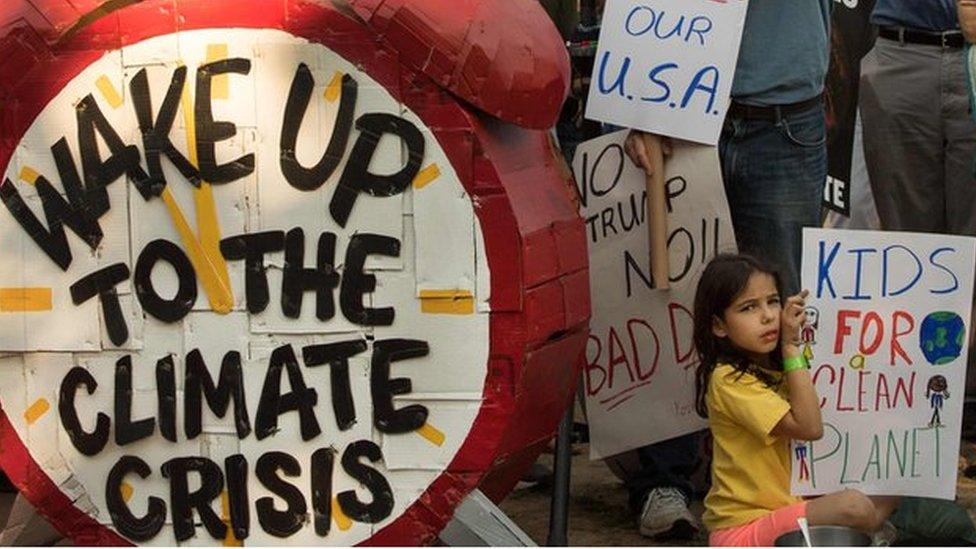Does Trump still think climate change is a hoax?
- Published

Melting glacier in Austria
For a speech about whether the US should remain a party to the Paris climate accord, Donald Trump's Rose Garden address on Thursday didn't have a whole lot of discussion about, you know, the climate.
There was plenty of talk about jobs and the US economy. He offered more than a few expressions of concern over whether other nations were being given an unfair advantage over the US. And then there was that lengthy opening plug for his presidential accomplishments that had nothing to do with the environment whatsoever.
At one point the president made a somewhat oblique reference to current climate science, asserting that even if all nations hit their self-set, non-mandatory greenhouse gas emissions targets under the Paris agreement, it would only result in a reduction of 0.2 degrees in average global temperatures by the year 2100. (The researchers who conducted the study said, external the number he cited was outdated and misrepresented.)
Mr Trump's relative silence on the matter has left reporters wondering whether the president still stands by earlier comments - and tweets - expressing serious scepticism about whether climate change is real.
Does he still believe it's a Chinese plot to make the US less competitive, as he tweeted, external in November 2012? Or that it is a money-making "hoax", as he said, external during a December 2015 campaign rally?"
President Trump says the Paris climate accord "disadvantages" US
He's occasionally backed away from such sweeping denunciations. During the first presidential debate with Hillary Clinton, he denied having ever blamed the Chinese. In a New York Times interview, external shortly after his election victory, he said he thinks there's "some connectivity" between human activity and climate change.
After Mr Trump announced his Paris agreement withdrawal, reporters posed the almost-too-obvious question once again to White House aides tasked with selling the move to the public. Does the president believe human activity contributes to climate change?
They asked about it during an on-background session with two administration officials on Thursday afternoon. They asked White House advisor Kellyanne Conway during a television appearance Friday morning. They asked Environmental Protection Agency head Scott Pruitt during his press conference on Friday afternoon.
Time and time again the answer was some variation of "I don't know", "I can't say" or "that's not relevant".
"We focused on one key issue," Mr Pruitt said during one of the multiple times he was pressed on his boss's views. "Was Paris good or bad for the country?"
On Tuesday Press Secretary Sean Spicer had said he didn't know the president's thoughts about climate change because he hadn't asked him. On Friday he was asked whether he had since had a chance to speak to the president.

One question dominated the briefing
"I have not had the opportunity to do that," Spicer replied.
The rest of the press conference was an extended parlour game to try to get the press secretary to slip and perhaps inadvertently shed some light on Mr Trump's views - to no avail.
It's clear at this point that the administration has no interest in clarifying Mr Trump's position on climate change. But why?
Students from Hazleton, Pennsylvania, are divided on Trump Paris pullout
Confusion can often be a politician's ally. The embattled president needs his core supporters to stick with him through what could be a rough road ahead. Those who don't believe climate change is real can look at the president's past comments as proof their man still stands with them without anyone having to explicitly say so.
That allows the president to insist that he is willing to do something to address climate change - "renegotiating" the Paris accord, perhaps - without saying climate change is a problem. It allows him tell the majority of Americans, external who believe climate change is a real global threat that he is trying to address their concerns.
It allows administration surrogates like Mr Pruitt to tout that the US has lowered its carbon output without acknowledging the only reason this would be a noteworthy accomplishment - human activity affects the global climate.
It's a fine line to walk for even the most dextrous of White House communications teams - let alone one that has to be concerned that the next time the president is asked the question, there's no telling what he might say.
- Published2 June 2017

- Published2 June 2017

- Published1 June 2017